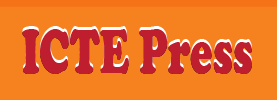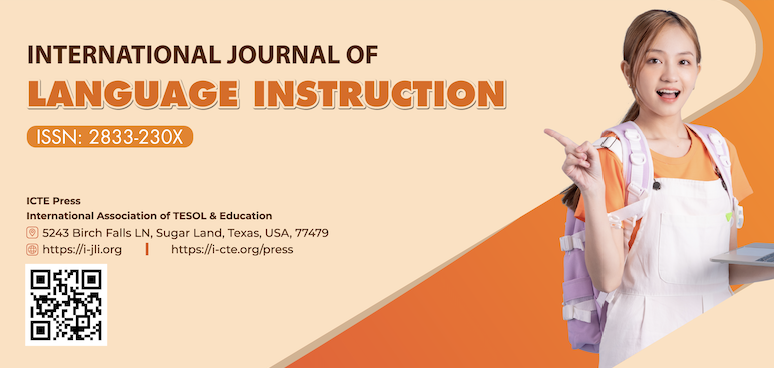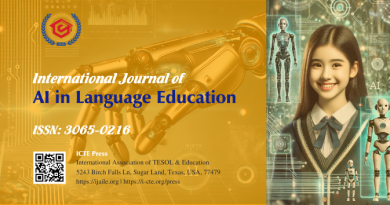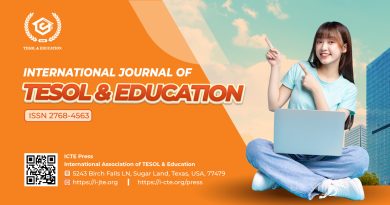Language Instruction: Vol. 4, No. 1 (2025)
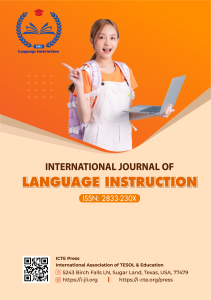 Dear beloved language instructors,
Dear beloved language instructors,
We are delighted to announce that the International Journal of Language Instruction (IJLI) has successfully completed its mission for Volume 4, Number 1, 2025. This latest issue marks another significant milestone in our ongoing commitment to advancing research, scholarship, and practice in the field of language instruction.
In this issue, Madden and Robinson (2024) explored the use of a creative icebreaker in EFL classrooms to enhance students’ speaking competence and classroom climate. Their qualitative findings revealed the activity was engaging, enjoyable, and effective in preliminarily assessing speaking skills. While culturally sensitive, the strategy offers practical pedagogical value for fostering communicative competence and learner interaction.
Rai and Pokharel (2025) investigated instruction-giving strategies among EFL teachers in Nepal, revealing that repetition, modeling, and clear time-setting enhance student comprehension. Despite these strengths, overuse of L1 and insufficient comprehension checks hinder effectiveness. The study highlights the need for teacher training focused on motivational techniques and structured, learner-centered instruction to optimize classroom outcomes.
Ho and Ha (2025) examined students’ perceptions of learning outcomes in a research writing course within Vietnam’s Outcome-Based Education (OBE) framework. Using mixed methods, findings show students valued structured writing tasks, peer feedback, and instructor support. While outcomes were generally achieved, students desired more time and practice for advanced writing skills, suggesting curriculum adjustments are needed.
Ngo (2025) explored Vietnamese EFL learners’ perceptions of translanguaging at an English center in Ho Chi Minh City. Using a mixed-methods design, the study found that learners generally viewed translanguaging as cognitively and socially beneficial, especially for lower-proficiency students. While it supported comprehension and collaboration, some higher-proficiency learners found it distracting. The study emphasizes context-sensitive, balanced implementation.
The final paper conducted by Nguyen and Bui (2025) who examined Vietnamese EFL teachers’ perceptions of challenges in teaching idioms to B1 learners. Findings revealed difficulties with learners’ comprehension of figurative meanings, limited contextual resources, and cultural mismatches. Despite these barriers, teachers acknowledged idioms’ importance and cultural richness. The study advocates for contextualized, culturally embedded, and learner-centered strategies in idiom instruction.
We extend our sincere gratitude and appreciation to all authors whose high-quality and insightful contributions have enriched this issue. Your dedication and rigorous research have provided invaluable insights into current trends, challenges, and innovations in language education. We also warmly recognize the institutions and universities with which our contributing authors are affiliated, whose support plays a critical role in fostering scholarly excellence.
Our heartfelt thanks also go to the reviewers who generously devoted their time and expertise to ensure the scholarly rigor and high standards of the articles published. Your meticulous reviews and constructive feedback were essential in enhancing the quality and academic integrity of this issue.
Additionally, we deeply appreciate the guidance and unwavering support from the distinguished members of our editorial board, whose collective expertise continues to shape IJLI into a respected and authoritative source in language instruction research.
We invite researchers, educators, and practitioners in language instruction and related fields to submit manuscripts for consideration in our upcoming issue, Volume 4, Number 2, 2025. We welcome original research articles, review articles, and pedagogical studies that contribute to our understanding and advancement of language education worldwide.
Thank you all once again for your continued support and contributions to the International Journal of Language Instruction.
Sincerely,
Editor-in-chief
International Journal of Language Instruction
